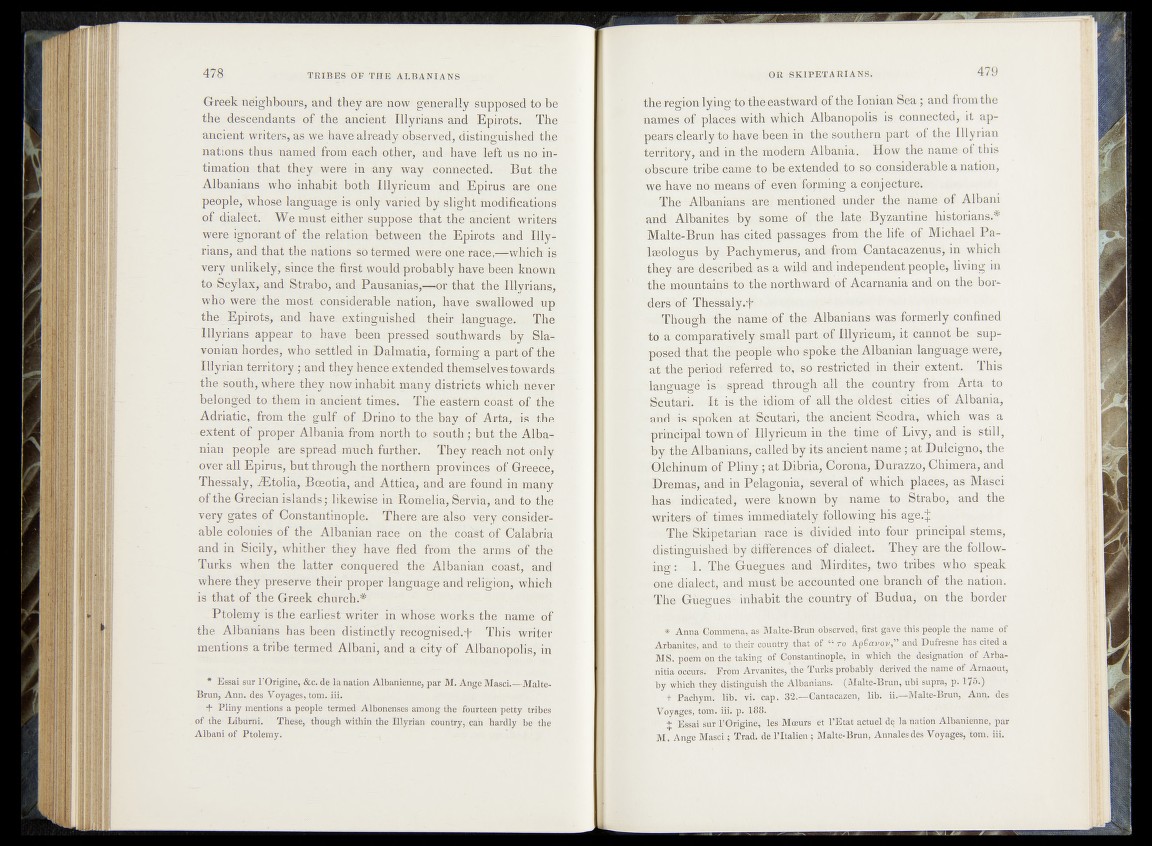
Greek neighbours, and they are now* generally supposed to be
the descendants of the ancient Illyrians and Epirots. The
ancient writers, as we have already observed, distinguished tie
nations thus named from each other, and have left us no intimation
that they were in any way-connected».’ But the
Albanians who inhabit both Illyrieum andvEpirus are one
people, 'whose language is only varied by slight modifications
of dialect^ We must either suppose that the ancient writers
were ignorant of the relation between the Epirots and IlLfl
rians, and that the nations so termed were one race,—which Is
very'unlikely', since the first would probably have-been known
to Scpax, and Strabo, and Pausanias,—-or that the Illyrians,
who were- the most considerable, nation, have swallowed . up
the Epirots, and have/extinguished > their langiia-g^i. The
Illyrians appear to have been pressed, southward$$^ ^ S l a vonian
hordes, who settled in Dalmatia, forming a part.of the
Illyrian territory; and they henetiextendejd themsftoesrtowarc[&,
the south, where they now inhabit many districts which ne^ei?
belonged to them in ancient times. Theeafsfêrn thé
Adriatic, from the gulf :of JDrino taJhébays óf Arta, ds the
extent of proper Albania from north torseuth • but the Alba”
nian peoplp are spread nruch further. They reae¬-enhy
over all Epirus, but through tlïe.northern
Thessaly, iEtolia, Bceotia, and Attica, and are-foundsiisfcfelty
of the Grecian islands; likewise in Romelia, Servin', and.-to the
very gates of Constantinople. There are aisp »very considerable
colonies of the Albanian race on the3 coaSt of Calabria
and in Sicily, whither they have fled from the arms of thé’
Turks when the latter conquered the Albanian coast,"and
where they preserve their proper language and religion, which
is that of the Greek church.#
Ptolemy is the earliest writer in whose works the name of
the Albanians has been distinctly recognised.-f*- This writer
mentions a tribe termed Albani, and a city of Albanopolis, in
• Essai sur Mhagiae, &c. 4e4a nation Albanienne, par M. Ange Masci.—Malie-
Brun, Ann. des Voyages, tom. iii.
+ Pliny mentions a people termed Albonenses among the fourteen petty tribes
of the Liburni. These, though within the Illyrian country, can hardly be the
Albani of Ptolemy.
the region lying,to the eastward of the Ionian Sea; and from the
names of places with which Albanopolis is connected, it appears
clearly to hatfe been in the southern part of the Illyrian
territory, and iapthe modern Albania.. How the name of this
'■Obscure tribe came to be extended to so, Considerable a nation,
we have no nieans-df even forming a conjecture.
The Albanians .'are, mentioned under the name of Albani
and AlbaniteSi by some; of, the late Byzantine historians.*
Malte-Brun has cited passages-from the life’„of Michael Pa-
Paqhymerm§‘, and from CantacazennSjdft which
they^ are . described, as a, wild and independent people, living in
.the mountains 40 %e-northward of Acarnania and on the bord
e r s '^ Thessaly.t '
Though the namekof the Albanians was formerly confined
to a epnparati vely^smal 1 part o,f Illyficum', it cannot he supposed
that the people-who spoke the Albanian language were,
^afesthe period referred toti so-restricted in >their extent. This
language' spread through all thei-oountry from Arta to
•'Scutari, H-isdshe. idiom, of^aliHhe oldest cities of Albania,
aiid is -at Scutari, the. ancient Sc^dra, which was a
principal town'of Illyricum in the-, time of Livy, and is still,
byethoAlbaniansy ealled by its ancient name; at Dulcigno, the
rQlehinum of Pliny ; at Dibria, Ge*ona, Durazzo, Chimera, and
Bremas, and in Pelagopia, several pfr which places, as Masci
has indicated; were known by name tq Strabo, and the
writersofftimes- immediately following h isag e .$ :.;
• The Skipotarian race- is-tdivided into four principal stems,
distinguished by differences of dialect.; They are the following
: (>l?®Thej Guegues and Mirdites, two tribes w.ho speak
one dialect, and«;niu§t;jbe accounted one.branch of the nation.
The Guegues - inhabit the country of Budua, on the border
* Ann» r.m m ma. as Malte-Brun observed, first gave this people the name of
AtI)unites, and ip their country that of “ ro Ap€ayov,” and Dufresne has cited a
MS. poem on the taking of Constantinople; inP which the designation of Arba-
hitia occurs. 'Fram Arvanites,’the Turks probably derived the name of Araaout,
" " by which they distinguish the Albanians. (Malte-Brun, ubi supra, p. 1?5§‘
V":r+; Pachym. lib. (vr: cap. 82.—Cantacazen, lib. ii.—Malte-Brun, Ani^. des
Voyages, tom.‘iii. p. 188.
± Essai sur t ’Origine, les Mceurs et l’Etat actuel de la nation Albanienne, par
M. Ange Masci; Trad, de l’ltalien; Malte-Brun, Armaises des Voyages, tom; iii.